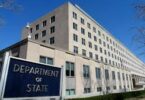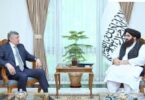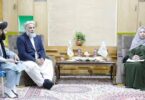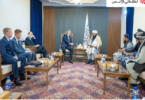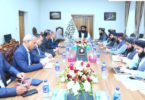Monitoring Desk
KABUL: At least 40 staff members in Afghanistan’s presidential palace have tested positive for Covid-19, Afghan officials said on Sunday, forcing President Ashraf Ghani to isolate himself and manage the country’s response to the virus — amid a raging war — largely via video conference.
There is no evidence that Mr. Ghani himself is infected. His spokesman would not comment on whether the president had been tested.
But the reach of the virus deep into the center of Afghan power, guarded behind several layers of security to protect against truck bombings and suicide assaults, was a troubling omen of difficult times ahead. Officials are grappling with the spread of the disease and its economic ramifications for the impoverished nation even as they fend off Taliban onslaughts.
An official at the palace said that most of the 40 people who tested positive work for the administrative wing of the president’s office, the National Security Council and the office of Mr. Ghani’s chief of staff. A second senior official confirmed that dozens had tested positive after hundreds of palace workers were tested more than a week ago.
The official did not provide further details, but said those with confirmed infections were sent into quarantine.
Afghanistan has reported just under 1,000 cases of the virus. But those numbers certainly underestimate the spread, officials say, since testing has been extremely limited. The country has conducted only about 7,000 tests.
As the virus gutted neighboring Iran and shattered its already reeling economy, choking under American sanctions, Afghanistan was extremely vulnerable. The government was unable to stop the flow of thousands of migrants and laborers — some days as many as 16,000 people — back into Afghanistan through the roughly 500-mile border the two countries share.
The spread of the virus is testing Afghanistan’s fragile government as never before. It is locked in a political crisis born of an election dispute and preparing for delicate negotiations with the Taliban to end the long war.
Afghan leaders are trying to ensure the flow of food and goods into the landlocked country to control rising prices. But a bureaucracy for decades fueled by international donations and dependent on aid organizations to provide, in its name, the most basic services seems to be buckling under the pressure of leading the response.
Millions of dollars in emergency cash has been sent to the provinces, but local administrations are overwhelmed by a lack of capacity to spend, and by a culture of heavily centralized procurement processes that require layers of approval from Kabul.
Although admitting that they don’t have a good sense of the spread of the virus in the absence of testing capacity, Afghan leaders repeatedly cite as a sign of success the low fatality reports. But that is at best a flimsy barometer, given that official record-keeping of deaths is rare and that the worst of the virus is most likely yet to come.
“We are ahead of the curve in thinking and planning,” Amrullah Saleh, one of Mr. Ghani’s two vice presidents, said on Twitter. “Behind the curve in resource mobilization.”
Although the officially recorded death toll from the virus around the country stands at 33, many have cast doubt on those figures. In Surobi, a district on the outskirts of Kabul, residents in recent days asserted that at least 30 people with coronavirus symptoms had died over a couple of weeks.
Mr. Ghani, 70, who lost much of his stomach to cancer decades ago, has kept himself isolated in recent weeks, appearing in person only at some events and attending most of his engagements via video conference. On Sunday, his office put out a picture of him meeting with visiting Iranian officials; Mr. Ghani wore what appeared to be an N-95 mask and latex gloves.
Reuters quoted a senior health official as saying that the virus had arrived in the palace offices via “a contaminated document,” though experts say the risk of the disease’s being spread through paper appears extremely low. The Afghan president, an anthropologist and former professor, has a penchant for reading; he spends much of his evenings poring over hundreds of government documents at his residence and often rewrites strategy papers drafted by his officials.
The flow of people into the palace has been reduced, and visitors are now sprayed with disinfectant head to toe and subject to temperature checks before they are frisked by elite guards in hazmat suits.
But in early March, more than two weeks after Afghanistan recorded its first positive case and the government was discouraging large gatherings, thousands of guests from around the country packed into the palace as Mr. Ghani took the oath of office for his second term. (The New York Times)

